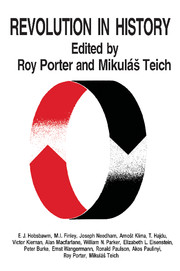Book contents
- Frontmatter
- Contents
- Notes on contributors
- Introduction
- 1 Revolution
- 2 Revolution in antiquity
- 3 Social devolution and revolution: Ta Thung and Thai Phing
- 4 The bourgeois revolution of 1848–9 in Central Europe
- 5 Socialist revolution in Central Europe, 1917–21
- 6 Imperialism and revolution
- 7 Socio-economic revolution in England and the origin of the modern world
- 8 Agrarian and industrial revolutions
- 9 On revolution and the printed word
- 10 Revolution in popular culture
- 11 Revolution in music – music in revolution
- 12 Revolution and the visual arts
- 13 Revolution and technology
- 14 The scientific revolution: a spoke in the wheel?
- 15 The scientific-technical revolution: an historical event in the twentieth century
- Index
3 - Social devolution and revolution: Ta Thung and Thai Phing
Published online by Cambridge University Press: 05 February 2015
- Frontmatter
- Contents
- Notes on contributors
- Introduction
- 1 Revolution
- 2 Revolution in antiquity
- 3 Social devolution and revolution: Ta Thung and Thai Phing
- 4 The bourgeois revolution of 1848–9 in Central Europe
- 5 Socialist revolution in Central Europe, 1917–21
- 6 Imperialism and revolution
- 7 Socio-economic revolution in England and the origin of the modern world
- 8 Agrarian and industrial revolutions
- 9 On revolution and the printed word
- 10 Revolution in popular culture
- 11 Revolution in music – music in revolution
- 12 Revolution and the visual arts
- 13 Revolution and technology
- 14 The scientific revolution: a spoke in the wheel?
- 15 The scientific-technical revolution: an historical event in the twentieth century
- Index
Summary
As is well known, China before modern times (1911 and 1949) had no revolutions involving fundamental changes in social structure. There were profound dynastic changes, after the establishment of the first unified empire under Chhin Shih Huang Ti, and there were foreign invasions, sometimes leading to the establishment of new dynasties, covering the whole or parts of the vast Chinese oikoumene. Above all, there were peasant-farmer rebellions, everlastingly renewed; but always their main objective was to set up a new dynasty which should adhere more closely to the good government recommended by the sages of old. Indeed some scholars have spoken of a regular ‘dynastic cycle’, in which a dynasty would begin with one or more strong, just and popular rulers, after which the imperial power would more and more degenerate, until a new peasant rebellion would bring about a new and fundamental (up to a point) change. But all this did not mean that certain concepts, like rallying-cries, did not run through the whole historical scheme, surfacing century after century, and inspiring men to actions designed to restore the good government of which the sages had spoken. In this paper we shall be considering two of these: Ta Thung, the Great Togetherness, and Thai Phing, the Realm of Great Peace and Equality. Such concepts must be treated with reverence, since they represented ideals for which men were ready to fight and die century after century. In so far as the aims of peasant rebellions were so dynastic, they might be thought to agree with those cyclical conceptions of time which had been known from antiquity onwards in China; yet there was always another conception, that of social evolution in continuous time. This had ever been characteristic of Chinese philosophy, with its lists of culture-heroes and inventors, and it had also brought mankind up out of primitive savagery into a rational civilization.
- Type
- Chapter
- Information
- Revolution in History , pp. 61 - 73Publisher: Cambridge University PressPrint publication year: 1986



